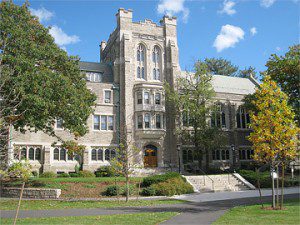The Los Angeles Times reports that the U.S. 9th Circuit Court of Appeals ruled in favor of San Diego State University in a lawsuit brought by two Christian student groups. They claimed that the university’s nondiscrimination policy for student groups violated their constitutional rights. But the court held in favor of the university, concluding that their policy is constitutional. (You can download the court’s decision here.)
 Here is the official policy, according to the court’s decision:
Here is the official policy, according to the court’s decision:
On-campus status will not be granted to any student organization whose application is incomplete or restricts membership or eligibility to hold appointed or elected student officer positions in the campus- recognized chapter or group on the basis of race, sex, color, age, religion, national origin, marital status, sexual orientation, physical or mental handicap, ancestry, or medical condition, except as explicitly exempted under federal law.
On-campus status entitles a group to use of university buildings for meetings at no charge, greater freedom to promote a group on campus, etc.
Judge Kenneth F. Ripple concurred in the court’s judgment. In his opinion, he writes”
For many groups, the intrusive burden established by this requirement can be assuaged partially by defining the group or membership to include those who, although they do not share the dominant, immutable characteristic, otherwise sympathize with the group’s views. Most groups dedicated to forwarding the rights of a “protected” group are able to couch their membership requirements in terms of shared beliefs, as opposed to shared status. Opponents of violence against women could limit their membership to all individuals dedicated to eradicating physical, mental or emotional abuse against female domestic partners. A gay, lesbian and transgender students group could limit their membership to all individuals dedicated to achieving equal political and social recognition of gay, lesbian and transgender persons.
Religious students, however, do not have this luxury—their shared beliefs coincide with their shared status. They cannot otherwise define themselves and not run afoul of the nondiscrimination policy. . . . The Catholic Newman Center cannot restrict its leadership— those who organize and lead weekly worship services—to members in good standing of the Catholic Church without violating the policy. Groups whose main purpose is to engage in the exercise of religious freedoms do not possess the same means of accommodating the heavy hand of the State.
The net result of this selective policy is therefore to marginalize in the life of the institution those activities, practices and discourses that are religiously based. While those who espouse other causes may control their membership and come together for mutual support, others, including those exercising one of our most fundamental liberties—the right to free exercise of one’s religion—cannot, at least on equal terms.
I must confess I find the judge’s reasoning to be both confusing and disconcerting. He believes that certain groups could limit their membership by requiring common beliefs and goals. But religious groups would be unable to do this. So, a group “dedicated to achieving equal political and social recognition of gay, lesbian and transgender persons” could limit its membership to those who share this dedication. But a group dedicated to “living out the kingdom of God as found in the preaching of Jesus” could not limit its membership to those who were similarly committed. This I don’t understand.
I think Judge Ripple hits the nail on the head when he concludes: “The net result of this selective policy is therefore to marginalize in the life of the institution those activities, practices and discourses that are religiously based.” Not knowing anything about this judge, my sense is that he is not happy with the law as it it written, but feels obligated to uphold it. Nevertheless, it is disconcerting that a university would uphold and continue to uphold a policy that marginalizes something so central to our cultural life as religion. Of course, it seems that the officials of San Diego State University would prefer that religion have little or no relevance to the culture of the university.
I expect this is the beginning of a juggernaut of legal and institutional decisions that will marginalize religion in secular colleges and universities. There was a time when this would severely cripple efforts of religious people to practice their religion. The growth of digital social media, however, limits the damage in many ways.
It will be interesting to see if colleges and universities apply their nondiscrimination policies in an evenhanded way. The court recognized that San Diego State may not have been doing this, choosing instead to single out conservative Christian groups. I wonder what will happen when minority religious groups are impacted. Will San Diego State be as eager to squelch Muslim, Jewish, Sikh, and Hindu groups?
The larger issue here is what sort of a society we want. Many secularists, who are disproportionately represented in universities, yearn for a public square with no religious presence. Some Christians seem to want to dominate the public square in the United States. But most Christians I know only want to seat at the table. We want to be in public conversation with all kinds of different religionists and secularists and you name it, believing that this sort of society will be freer, deeper, and more truly American.











